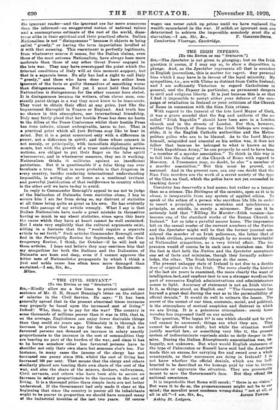"THE CIVIL SERVANT:" (To sae EDITOR OF TER " SPEouTon.")
Sia,—Kindly allow me a few lines to protest against one (sentence of Mr. G. H. Stuart Bunning's letter on -the subject of salaries in the Civil Service. He says: -"It has been generally agreed that in the present abnormal times increases may properly be- based upon the increased oast of living." Indeed! Who, then, is to pay for the war? The country is some thousands of millions poorer than it was in 11)14, that is, on the average, Englishmen can enjoy fewer desirable things than they could six years ago. Ultimately it is through the Increase in prices that we pay for the war. But if a few favoured persons can -demand an increase in salary exactly proportionate to the increase in the cost of commodities they are bearing no part of the burden of the war, and since it has 4o be borne somehow other less favoured persons have to *boulder not only their awn share but someone else's too. For instance, in many cases the income of the clergy has not Increased one penny since 1914, whilst the cost of living has increased 160 per cent. That means that the clergy and others similarly placed are bearing their own share of the cost of the war, and .also the share of the miners, dockers, railwaymen, Civil servants, and others who have been able to secure an -increase in salary proportionate to the increase in the cost of living. It is a thousand pities these simple facts are not better understood. If -the Government had only made it clear at the beginning that since the country is poorer all its inhabitants ought to be poorer in proportion we should have escaped many of the industrial troubles of the last two years. Of course
wages can never catch up prices until we have replaced the wealth squandered in the war. If selfish or ignorant men are doter.minecl to achieve the impossible somebody must die of






































 Previous page
Previous page